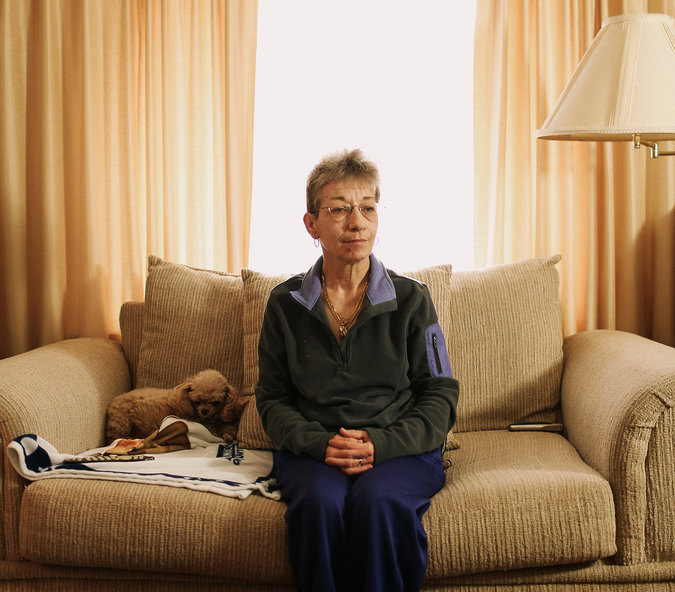WELCH, W.Va. — Sharon Mills, a disabled nurse, long depended on other people’s kindness to manage her diabetes. She scrounged free samples from doctors’ offices, signed up for drug company discounts and asked for money from her parents and friends. Her church often helped, but last month used its charitable funds to help repair other members’ furnaces.

Ms. Mills, 54, who suffered renal failure last year after having irregular access to medication, said her dependence on others left her feeling helpless and depressed. I got to the point when I decided I just didn’t want to be here anymore,” she said.
So when a blue slip of paper arrived in the mail this month with a new Medicaid number on it — part of the expanded coverage offered under the Affordable Care Act — Ms. Mills said she felt as if she could breathe again for the first time in years. The heavy thing that was pressing on me is gone,” she said.
As health care coverage under the new law sputters to life, it is already having a profound effect on the lives of poor Americans. Enrollment in private insurance plans has been sluggish, but sign-ups for Medicaid, the federal insurance program for the poor, have surged in many states. Here in West Virginia, which has some of the shortest life spans and highest poverty rates in the country, the strength of the demand has surprised officials, with more than 75,000 people enrolling in Medicaid.
While many people who have signed up so far for private insurance through the new insurance exchanges had some kind of health care coverage before, recent studies have found, most of the people getting coverage under the Medicaid expansion were previously uninsured. In West Virginia, where the Democratic governor agreed to expand Medicaid eligibility, the number of uninsured people in the state has been reduced by about a third.
America ranks near the bottom of developed countries in health and longevity, and many public health experts believe that improving that ranking will be impossible without paying more attention to poor Americans. It is still an open question whether access to health insurance will improve the health of the disadvantaged in the long run, experts say, but the men and women getting the coverage here say the mere fact of having it has drastically improved their mental health.
Waitresses, fast food workers, security guards and cleaners described feeling intense relief that they are now protected from the punishing medical bills that have punched holes in their family budgets. They spoke in interviews of reclaiming the dignity they had lost over years of being turned away from doctors’ offices because they did not have insurance.
You see it in their faces,” said Janie Hovatter, a patient advocate atCabin Creek Health Systems, a health clinic in southern West Virginia. They just kind of relax.”
Still, even among those who most need insurance, there has been resistance to signing up. President Obama — often blamed here in coal country for the industry’s decline — remains deeply unpopular. Recruiters trying to persuade people to enroll say they sometimes feel like drug peddlers. The people they approach often talk in hushed tones out of earshot of others.
Chad Webb, a shy 30-year-old who is enrolling people in Mingo County, said a woman at a recent event used biblical terms to disparage Mr. Obama as an existential threat to the nation. Mr. Webb said he thought to himself: This man is not the Antichrist. He just wants you to have health insurance.”
Eventually, though, people’s desperate need for insurance seems to be overcoming their distaste for the president. Rachelle Williams, 25, an uninsured McDonald’s worker from Mingo County, said she had refused to fill out insurance forms on a recent trip to the emergency room for a painful bout of kidney stones. I wouldn’t do it,” she said. But when she got a letter in the mail saying she qualified for Medicaid, she signed up immediately.
Uninsured people tend to be sicker and to die younger than those with insurance, and experts have reasoned that coverage should give poor Americans a better chance to improve their health. But an influential study found that lack of access to medical care accounts for just 10 percent of premature deaths in the country, compared with the 40 percent from behavioral factors like smoking and eating unhealthful food. The rest is linked to genetics, and social and environmental factors.
A widely cited experiment in Oregon offered an early look at what happens when people suddenly get Medicaid coverage. Researchers found that physical health, like obesity and the prevalence of diabetes, did not change much. But mental health improved drastically, with instances of depression plummeting. Ms. Mills said the simple relief of having coverage had helped drive away her suicidal thoughts.
Welch is a tiny town in McDowell County, a remote patch of mountains dotted by coal mines and forests logged for timber. Life expectancy here for men is just 64 years — the lowest in the country, and even lower than in Pakistan. Rates of smoking and diabetes here are nearly double the national average, and almost half the men are obese.
In communities like these, people often eat the cheapest, most convenient, food at hand.
Poverty is short-term thinking — what can I do today to survive,” said Sister Janet Peterworth, a charity worker in Mingo County who is enrolling people.
It also costs more to live better. Can people adopt middle-class health behaviors without being middle class?” said Adam Drewnowski, director of the Center for Public Health Nutrition at the University of Washington.
Lavetta Hutchinson, a nurse in McDowell County, is pessimistic about the law’s potential to improve health in the area. Lack of economic opportunity, low levels of education and the resulting despair have driven a raging drug epidemic and created a kind of fatalism.
People think they are going to live as long as they are going to live, and there’s nothing they can do to change it,” she said. They don’t see the value of prevention.”
It remains to be seen how Medicaid coverage will work once millions more people across the country are in the system. Low reimbursement rates discourage specialists from taking Medicaid patients.
But Gina Justice, a social worker with the Mingo County Diabetes Coalition, said many of her patients have to choose now between medicine and food, so access to critical medications through new coverage will be a lifeline.
People tell us, ‘This is the food month,’ ” Ms. Justice said. If you can take away that stress because now you’ve got a medical card, then you can focus on healthier eating that will help with these medical issues.”
And there is a high price for being uninsured, she said.
One patient, a coal truck driver in his 30s with diabetes, came in for treatment whenever he was insured, which was not often. Last summer, he had a stroke after a stretch when he had no coverage; he now walks with a cane and cannot drive. Another patient, a woman with diabetes, is now legally blind because she could not find an endocrinologist who would treat her, or a lab that would run tests, without insurance, Ms. Justice said.
Ms. Mills had to stop work at a hospital after badly injuring her back lifting a patient. She has struggled to buy her medications for Type 1 diabetes, and survives on about $12,000 a year from the hospital system where she worked. That is just above the official poverty line of $11,490 a year for a single person, and far above the old income limit for Medicaid eligibility, which was a third of poverty, or about $4,000 a year. (Only parents with dependent children were eligible; the new limit is 133 percent of poverty, or about $15,200 for an individual.) She is unable to work and lives in a small house with metal siding.
When she has had catastrophic events, like the renal failure last year, the state has temporarily put her on Medicaid, but Ms. Mills estimates that she has been insured for only a little over two of the last 12 years. She said permanent eligibility for Medicaid was a godsend.
It’s going to change her life,” said Ms. Hutchinson, the nurse, who occasionally treats her.
Last week, Ms. Mills used her Medicaid number for the first time to fill a prescription. It was a Wednesday, and she walked into Walmart feeling good.
Now I’ve got insurance,” she said, and I’m waving that piece of paper all over the place.”
Others, she said, seemed to have the same idea, judging by the line at the pharmacy. It was plumb over to the pet department!”





